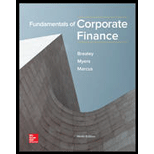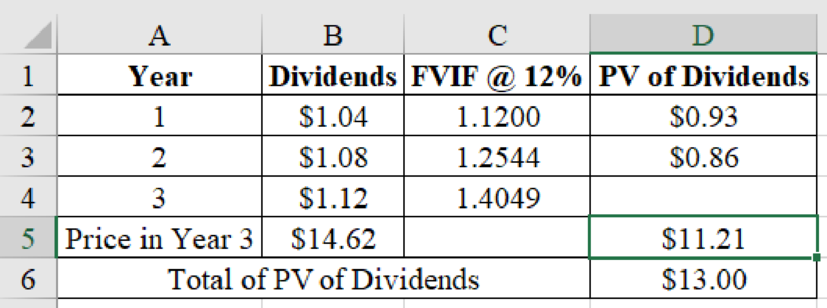
a.
To determine: The expected dividends for year 1, 2 and 3.
a.
Answer to Problem 12QP
The expected dividends for year 1 are $1.04, year 2 are $1.08 and year 3 are $1.12.
Explanation of Solution
Determine the expected dividends for year 1, 2 and 3
Therefore, the expected dividends for year 1 are $1.04, year 2 are $1.08 and year 3 are $1.12.
b.
To determine: The selling price of stock.
b.
Answer to Problem 12QP
The selling price of stockis $13.
Explanation of Solution
Determine the selling price of stock
Therefore, the selling price of stockis $13.
c.
To determine: The projected stock price three years from now.
c.
Answer to Problem 12QP
The projected stock price three years from nowis $14.62.
Explanation of Solution
Determine the projected stock price three years from now
Therefore, the projected stock price three years from nowis $14.62.
d.
To determine: The projectedcash flows for years 1, 2 and 3.
d.
Answer to Problem 12QP
The projectedcash flows for years 1 are $1.04, year 2 are $1.08 and year 3 are $15.75.
Explanation of Solution
Determine the projected cash flows for years 1, 2 and 3
The cash flows for year 1 and 2 will remain same as $1.04 and $1.08 respectively since the purchase happens only in year 3. The cash flow for year 3 is calculated below,
Therefore, the cash flows for year 3 is $15.75.
e.
To determine: The
e.
Answer to Problem 12QP
The present value of stream of payments for year 1 are $0.93, year 2 are $0.86 and year 3 are $11.21.
Explanation of Solution
Determine the cash flows for year 1, 2 and 3
Excel Spreadsheet:

Excel Workings:

Therefore, the present value of stream of payments for year 1 are $0.93, year 2 are $0.86 and year 3 are $11.21.
Want to see more full solutions like this?
Chapter 7 Solutions
Fundamentals of Corporate Finance (Mcgraw-hill/Irwin Series in Finance, Insurance, and Real Estate)
- Question 6 A five-year $50,000 endowment insurance for (60) has $1,000 underwriting expenses, 25% of the first premium is commission for the agent of record and renewal expenses are 5% of subsequent premiums. Write the gross future loss random variable: Presuming a portfolio of 10,000 identical and independent policies, the expected loss and the variance of the loss of the portfolio are given below (note that the premium basis is not given or needed): E[L] = 10,000(36,956.49 - 3.8786P) V[L] 10,000 (50,000 + 14.52P)². 0.00095 Find the premium that results in a 97.5% probability of profit (i.e. ¹ (0.975) = 1.96). Premium: Please show your work belowarrow_forwardWhat corporate finance?? can you explain this? fully no aiarrow_forwardWhat is corporate finance? how this is usefull?arrow_forward
- Pam and Jim are saving money for their two children who they plan to send to university.The eldest child will enter university in 5 years while the younger will enter in 7 years. Each child is expected spend four years at university. University fees are currently R20 000 per year and are expected to grow at 5% per year. These fees are paid at the beginning of each year.Pam and Jim currently have R40 000 in their savings and their plan is to save a fixed amount each year for the next 5 years. The first deposit taking place at the end of the current year and the last deposit at the date the first university fees are paid.Pam and Jim expect to earn 10% per year on their investments.What amount should they invest each year to meet the cost of their children’s university fees?arrow_forwardPam and Jim are saving money for their two children who they plan to send to university.The eldest child will enter university in 5 years while the younger will enter in 7 years. Each child is expected spend four years at university. University fees are currently R20 000 per year and are expected to grow at 5% per year. These fees are paid at the beginning of each year.Pam and Jim currently have R40 000 in their savings and their plan is to save a fixed amount each year for the next 5 years. The first deposit taking place at the end of the current year and the last deposit at the date the first university fees are paid.Pam and Jim expect to earn 10% per year on their investments.What amount should they invest each year to meet the cost of their children’s university fees?arrow_forwardYou make a loan of R100 000, with annual payments being made at the end of each year for the next 5 years at a 10% interest rate. How much interest is paid in the second year?arrow_forward
- Dr Z. Mthembu is the owner of Mr Granite, a business in the Western Cape. After more than 28 years of operation, the business is thinking about taking on a new project that would provide a profitable new clientele. With only R1.5 million in resources, the company is now working on two competing projects. The starting costs for Project X and Project Y are R625,000 and R600000, respectively. These projected are estimated for the next 7 years timeframe. According to SARS, the tax rate is 28%, and a discount rate of 11.25% is applied.Projects X Project YProject X Project Y129000 145000154000 145000312000 145000168000 14500098250 14500088750 14500016050 145000arrow_forwardDr Z. Mthembu is the owner of Mr Granite, a business in the Western Cape. After more than 28 years of operation, the business is thinking about taking on a new project that would provide a profitable new clientele. With only R1.5 million in resources, the company is now working on two competing projects. The starting costs for Project X and Project Y are R625,000 and R600000, respectively. These projected are estimated for the next 7 years timeframe. According to SARS, the tax rate is 28%, and a discount rate of 11.25% is applied.Projects X Project YProject X Project Y129000 145000154000 145000312000 145000168000 14500098250 14500088750 14500016050 145000arrow_forwardDr Z. Mthembu is the owner of Mr Granite, a business in the Western Cape. After more than 28 years of operation, the business is thinking about taking on a new project that would provide a profitable new clientele. With only R1.5 million in resources, the company is now working on two competing projects. The starting costs for Project X and Project Y are R625,000 and R600000, respectively. These projected are estimated for the next 7 years timeframe. According to SARS, the tax rate is 28%, and a discount rate of 11.25% is applied.Projects X Project YProject X Project Y129000 145000154000 145000312000 145000168000 14500098250 14500088750 14500016050 145000arrow_forward
- Dr Z. Mthembu is the owner of Mr Granite, a business in the Western Cape. After more than 28 years of operation, the business is thinking about taking on a new project that would provide a profitable new clientele. With only R1.5 million in resources, the company is now working on two competing projects. The starting costs for Project X and Project Y are R625,000 and R600000, respectively. These projected are estimated for the next 7 years timeframe. According to SARS, the tax rate is 28%, and a discount rate of 11.25% is applied.Projects X Project YProject X Project Y129000 145000154000 145000312000 145000168000 14500098250 14500088750 14500016050 145000arrow_forwardAn investor buys 100 shares of a $40 stock that pays an annual cash dividend of $2 a share (a 5 percent dividend yield) and signs up for the DRIP. a. If neither the dividend nor the price changes, how many shares will the investor have at the end of 10 years? How much will the position in the stock be worth? Answer: 5.000 shares purchased in year 1 5.250 shares purchased in year 2 6.078 shares purchased in year 5 62.889 total shares purchased b. If the price of the stock rises by 6 percent annually but the dividend remains at $2 a share, how many shares are purchased each year for the next 10 years? How much is the total position worth at the end of 10 years? Answer: 4.717 shares purchased in year 1 4.592 shares in year 3 3.898 shares in year 10 Value of position: $10,280 c. If the price of the stock rises by 6 percent annually but the dividend rises by only 3 percent annually, how many shares are purchased each year for the next 10 years? How much is the total position worth at the…arrow_forwardDr Z. Mthembu is the owner of Mr Granite, a business in the Western Cape. After more than 28 years of operation, the business is thinking about taking on a new project that would provide a profitable new clientele. With only R1.5 million in resources, the company is now working on two competing projects. The starting costs for Project X and Project Y are R625,000 and R600000, respectively. These projected are estimated for the next 7 years timeframe. According to SARS, the tax rate is 28%, and a discount rate of 11.25% is applied.Projects X Project YProject X Project Y129000 145000154000 145000312000 145000168000 14500098250 14500088750 14500016050 145000 Calculate the IRR for the two proposed Projectsarrow_forward
 Essentials Of InvestmentsFinanceISBN:9781260013924Author:Bodie, Zvi, Kane, Alex, MARCUS, Alan J.Publisher:Mcgraw-hill Education,
Essentials Of InvestmentsFinanceISBN:9781260013924Author:Bodie, Zvi, Kane, Alex, MARCUS, Alan J.Publisher:Mcgraw-hill Education,

 Foundations Of FinanceFinanceISBN:9780134897264Author:KEOWN, Arthur J., Martin, John D., PETTY, J. WilliamPublisher:Pearson,
Foundations Of FinanceFinanceISBN:9780134897264Author:KEOWN, Arthur J., Martin, John D., PETTY, J. WilliamPublisher:Pearson, Fundamentals of Financial Management (MindTap Cou...FinanceISBN:9781337395250Author:Eugene F. Brigham, Joel F. HoustonPublisher:Cengage Learning
Fundamentals of Financial Management (MindTap Cou...FinanceISBN:9781337395250Author:Eugene F. Brigham, Joel F. HoustonPublisher:Cengage Learning Corporate Finance (The Mcgraw-hill/Irwin Series i...FinanceISBN:9780077861759Author:Stephen A. Ross Franco Modigliani Professor of Financial Economics Professor, Randolph W Westerfield Robert R. Dockson Deans Chair in Bus. Admin., Jeffrey Jaffe, Bradford D Jordan ProfessorPublisher:McGraw-Hill Education
Corporate Finance (The Mcgraw-hill/Irwin Series i...FinanceISBN:9780077861759Author:Stephen A. Ross Franco Modigliani Professor of Financial Economics Professor, Randolph W Westerfield Robert R. Dockson Deans Chair in Bus. Admin., Jeffrey Jaffe, Bradford D Jordan ProfessorPublisher:McGraw-Hill Education





